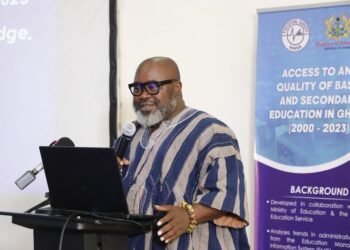Six individuals, including public officials from the Ghana Education Service (GES) and the Controller and Accountant-General’s Department, have been convicted by the High Court (Criminal Division) in Tamale for engaging in a payroll fraud scheme that cost the state over GHS86,000 in unearned salaries.
The case, titled The Republic v. Tahidu Yakubu & Five Others, is the result of enhanced investigations conducted by the Office of the Special Prosecutor (OSP).
“The convicted persons include school administrators, payroll officers, and accountants who facilitated the illegal validation and reactivation of salaries for a teacher who had vacated his post.
“Their actions led to the wrongful payment of over GHS 86,000, all of which has now been recovered—bringing the total amount retrieved to GHS 106,319.64.”
Office of the Special Prosecutor
It climaxed on April 30, 2025, with the acceptance of a plea bargain agreement by the Court, conviction of all six accused on their own plea of guilty, and full restitution of the financial loss caused to the State.
The first accused, Tahidu Yakubu, was a former teacher at Balogu M/A Junior High School (JHS) in Yendi.
He vacated his post in August 2022 after securing a new role as an Accounts Officer at the Microfinance and Small Loans Centre (MASLOC) in the North-East Region.
However, despite his exit from the teaching service, Yakubu continued to receive salary payments as a teacher for over a year—a situation made possible through a complex web of collusion with five other public officials.
The second accused, Abdulai Abubakar Sadic, served as the Integrated Municipal Personnel Payroll Database (IPPD) Coordinator at Yendi and was responsible for verifying salary reactivation requests.
The third accused, Sammy Suuk, was the Schools Improvement Support Officer (SISO) for the Yendi North Circuit, tasked with monitoring schools and verifying salary claims.
The fourth accused, Mohammed Yusif Jay, served as Headmaster of Balogu JHS at the time of Yakubu’s departure, and the fifth accused, Stafford Korletey Azudey-Barres, was an Assistant Chief Account Technician at the Controller and Accountant-General’s Department in Accra.
The sixth accused, Osman Issahaku, is the current Headmaster of Balogu JHS.

Details of the Fraud Scheme
According to the findings of the OSP, although Yakubu had vacated his teaching post in August 2022, both the fourth and third accused—the then Headmaster and SISO, respectively—knowingly continued to validate and verify his salary claims as though he were still at post.
This illicit validation process, according to the OSP report, spanned from August 2022 to January 2023, resulting in the payment of GHS25,162.66 in gross salary to Yakubu.
The report noted that out of this, GHS16,416.89 was deposited into his personal bank account as net salary, despite his concurrent employment at MASLOC.
According to the OPS, the scheme took a more elaborate turn in January 2024, when a falsified request was made to reactivate Yakubu’s salary for the period between July 2023 and February 2024.
The third accused authored a supporting letter, which was then verified by the second accused, who authenticated the fraudulent documentation.
The fifth accused further facilitated the reactivation and the eventual disbursement of the funds into Yakubu’s account. The sixth accused also submitted a separate false request for Yakubu’s salary reactivation.
The OSP report disclosed that these actions led to an additional GHS61,156.29 in gross salary arrears being accrued, with GHS47,064.34 paid directly to Yakubu. In total, the fraudulent activities resulted in the disbursement of GHS86,318.95 in unearned salaries to him.

Legal Proceedings and Plea Bargain
On March 13, 2025, the accused were formally charged and arraigned before the Tamale High Court on twenty-two counts of various corruption-related offences.
These included: corruption by and of a public officer, in violation of sections 239(1) and (2) of the Criminal Offences Act, 1960 (Act 29), as amended; false certificate by a public officer, under section 249 of the same Act; and causing financial loss to the Republic, contrary to section 179A(3)(a).
According to the OSP, upon the commencement of proceedings, all six accused initiated a plea bargain with the OSP in accordance with section 71(1) of the Office of the Special Prosecutor Act, 2017 (Act 959).
The accused voluntarily admitted guilt and expressed willingness to make restitution and provide information that could assist in prosecuting other corrupt individuals.
Special Prosecutor Kissi Agyebeng accepted the plea bargain, citing the accused persons’ lack of prior criminal history, their cooperation during investigations, and their readiness to support ongoing anti-corruption efforts.
Conviction and Restitution
The OSP report indicated that on April 30, 2025, the High Court accepted the plea bargain agreement and convicted all the accused based on their own plea of guilty.
The Court, under section 71(7) of Act 959, ordered the following: reparation of GHS20,000 to the state and restitution of GHS86,318.95, the total amount illegally obtained through salary fraud.

Additionally, two confidential orders were made regarding the provision of further information by the accused and their assistance in identifying and prosecuting other individuals involved in similar schemes.
The judgment included a stern warning: under section 70(9) of Act 959, failure by the accused to comply with the financial and other conditions imposed by the Court would trigger custodial sentences.
As of May 9, 2025, the OSP confirmed the full recovery of GHS106,319.64, comprising the restitution and reparation amounts, from the convicted individuals.
This recovery not only marks a significant success for the Special Prosecutor’s Office but also sends a strong signal to public officials who may be complicit in similar payroll abuses.
The outcome of this case is a significant victory in Ghana’s ongoing fight against corruption.
It shines a harsh spotlight on the vulnerability of the public payroll system, especially within the education sector, and the ease with which a coordinated ring of officials can manipulate the system for personal gain.
Furthermore, it validates the OSP’s strategic use of the plea bargain provision to expedite justice, recover stolen state funds, and secure crucial intelligence that could facilitate broader investigations.
This approach enhances deterrence while promoting transparency and accountability in public administration.
The recovery of over GHS106,000 in a single corruption case underscores the tangible benefits of empowering investigative institutions with both prosecutorial authority and financial recovery tools.
READ ALSO: Ghana’s Petroleum Consumption Soars 18.02% in Q1 2025




















